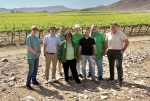…a conversation with Julien Karambua, Country Manager for Workforce Staffing Namibia
A leader in the recruitment, staffing, and outsourcing sectors, Workforce Staffing Namibia is operating within key industries such as oil and gas, mining, renewable energy, and clean energy sectors like green hydrogen and solar PV. As Namibia advances into these areas, the company is seeking to occupy a space where they provide workforce solutions that are flexible and scalable, in alignment with the fluctuating demands of these industries. Business Express (BE) spoke to Julien Karambua (JK), Country Manager for Workforce Staffing Namibia to how the company seeks to ensure that companies have access to the right talent pool, while also contributing to local skills development and employment within Namibia.
(BE): What inspired the founding of Workforce Staffing Namibia, especially in the context of the oil and gas sector?
(JK): The founding of Workforce Staffing Namibia was inspired by the significant strides the Namibian government has made in advancing sectors that are also growing globally, such as renewable energy, oil and gas, and green hydrogen, as well as the mining industry. We recognised an opportunity to offer our flexible and turnkey employment services in Namibia, while also ensuring that all employment-related matters are regulated and compliant within the country.
(BE): What are the key challenges facing the oil and gas industry in terms of human capital?
(JK): One of the primary challenges in the industry is the shortage of local skills, particularly in highly technical roles that are in demand. However, many companies, including service providers, offshore logistic supply companies, international oil companies, and drilling companies, have invested significantly in training local Namibians to help close the skills gap. This includes making sure they are employable and have the necessary certifications to work offshore, though much of this investment has been focused on lower-skilled positions. The challenge remains in finding high-level technical expertise, which often requires bringing in foreign specialists to manage these more complex operations.
Additionally, many Namibians have taken the initiative to cross borders, particularly to South Africa, to invest in their own training. This included certifications like OPITO (Oil & Petroleum Industry Training Organization), rope access training, and BOSIET (Basic Offshore Safety Induction and Emergency Training), along with UK medical qualifications for offshore work. By doing this, they have upskilled themselves to be able to enter and compete for positions in the sector.
(BE): What specific staffing solutions does Workforce Staffing Namibia provide to the oil and gas sector?
(JK): We provide tailored workforce solutions across the full spectrum of staffing needs, from highly skilled engineers and safety officers, to support roles such as head chefs, cooks, roughnecks, and motormen. While we don’t offer specialised training for the oil and gas sector, we do provide leadership and health and safety training in other industries. Our staffing services help companies manage fluctuating workforce demands, ensuring long-term operational commitments and offering employees opportunities to work in various sectors during industry downtimes.
We also focus on upskilling and reskilling Namibians to be employable in other industries when there are lulls in the oil and gas market. Our services include mobilisation and demobilisation of local workers, expat management, including visa and immigration services, and full payrolling solutions, taking care of taxes and statutory obligations.
(BE): How do you ensure that your candidates meet the specific needs of this industry?
(JK): We ensure that candidates meet the specific requirements of the industry by adhering to key certifications and safety standards. For example, certifications like BOSIET and UK medical qualifications are basic requirements for offshore work. Additionally, there are other industry-specific certifications, such as STCW, (Standards of Training Certification and Watchkeeping), that candidates must meet. We focus on ensuring compliance with international safety standards and provide access to industry-specific training through established partnerships to guarantee that our candidates are well-prepared for their roles.
(BE): How does your company plan to contribute to local employment and skills development in Namibia?
(JK): Workforce Staffing Namibia are committed to creating sustainable employment opportunities for Namibians through our temporary employment services model, which focuses on upskilling workers with the technical expertise needed for the oil and gas industry, as well as sectors like mining, logistics, green hydrogen, solar PV, and infrastructure. By ensuring candidates have the right certifications and discipline, we help them remain employable, even during periods of volatility in any sector. Additionally, we facilitate skills transfer from expats to local workers, enabling them to acquire the necessary expertise for future roles.
(BE): How do you envision the future of the oil and gas sector in Namibia, and what role will your company play in it?
(JK): We envision the oil and gas sector playing a critical role in Namibia’s GDP, and Workforce Staffing Namibia will be critical in providing the flexible, skilled workforce needed to sustain it. Our broader focus is to ensure that Namibians are not only prepared for the sector but also equipped with transferable skills, enabling them to work across multiple industries, especially during periods of volatility.
As we navigate potential downturns, it’s important to emphasise that our commitment extends beyond just the oil and gas industry. We recognise that the world is transitioning to clean energy, and while oil and gas will eventually phase out, resources like LNG (Liquefied Natural Gas) will serve as transitional fuels. Namibia possesses abundant LNG resources, and there is significant focus on extracting these during the transition phase to bolster GDP and economic growth.
Our goal is to maximise current resources to benefit all Namibians while gradually ramping up renewable energy solutions as part of a decarbonisation strategy. The oil and gas sector will provide foundational training and experience for workers, preparing them for future opportunities in clean energy.
(BE): How does Workforce Staffing Namibia engage with local communities and stakeholders?
(JK): We engage with local communities and stakeholders through a comprehensive stakeholder management plan tailored to specific projects. This ensures that local communities benefit from initiatives in their area. Our team comprises Namibians who possess a deep understanding of the diverse cultures and histories of the various tribes across the country, enabling effective communication and engagement.
We conduct meetings in local languages, facilitating negotiations that lead to project labour agreements, which outline terms of employment, benefits, and wage rates aligned with industry standards. We prioritise fair treatment for all Namibians, ensuring that even unskilled labourers are paid on time and accurately, while also complying with statutory obligations and making necessary contributions to social services.
This grassroots approach sets us apart, as we can manage workforce needs at all levels—from unskilled labour to highly skilled positions. Our local expertise provides foreign entities with a significant advantage, allowing them to navigate the complexities of community engagement and project execution effectively.
(BE): Are there any initiatives in place to support diversity and inclusion within the workforce?
(JK): We are committed to promoting diversity and inclusion within our workforce by advocating for opportunities not only for women but also for individuals from disadvantaged backgrounds and those living with disabilities. We believe in taking a holistic approach to inclusion.
To support this, we collaborate with other private companies to unlock opportunities for underrepresented groups, helping them obtain essential accreditations relevant to sectors like oil and gas. This initiative is a key focus for us as we work to create a more inclusive workforce.
(BE): What advice would you give to individuals looking to enter the oil and gas sector in Namibia?
(JK): My advice would be to focus on gaining the right technical skills and certifications that are in high demand. When you have the opportunity to go offshore, seize that chance to learn and upskill yourself continually. Always look for ways to elevate your career to the next level.
It’s also essential to develop a flexible and adaptable mindset, especially given the sector’s volatility. Don’t limit your focus solely to the oil and gas industry; explore adjacent industries such as green hydrogen and solar PV, which are rapidly growing in Namibia. Solar energy is becoming increasingly significant, with more solar panels being installed and green hydrogen initiatives emerging.
Most importantly, remember that a career is a journey that unfolds step by step. Avoid pouring all your energy and limited resources into oil and gas alone; consider the bigger picture. The energy landscape is transitioning, and it’s crucial to think about where your career will be in 15 to 20 years.
Investing in broader certifications or qualifications that will remain relevant in the future is vital. Treat oil and gas as a stepping stone toward greater opportunities in the evolving energy sector.
(BE): Is there anything else you would like to share with our readers about Workforce Staffing Namibia or the oil and gas sector in Namibia?
(JK): Workforce Staffing Namibia is more than just a staffing provider; we are a strategic partner and a catalyst for workforce development. The oil and gas sector offers significant opportunities, but its volatility means workers must be ready to transition across sectors. We are committed to helping Namibians upskill and remain employable, regardless of industry changes.
It’s crucial for job seekers to partner with a reputable organisation and never pay to secure a job. Workforce Staffing Namibia does not charge employees to apply or secure employment; our services are tailored to meet client needs.
We encourage individuals to view their careers as a journey that can transition from oil and gas into renewable energy and other sectors. Patience is also key—it’s important to prepare for periods when drilling activities may not be ongoing. Upskilling can facilitate transitions into more stable sectors, such as construction and mining.
Lastly, we urge Namibians to research and understand the industry thoroughly. Many people overlook the complexities involved in securing employment in this field. By educating themselves, they can better navigate the opportunities and challenges ahead.










